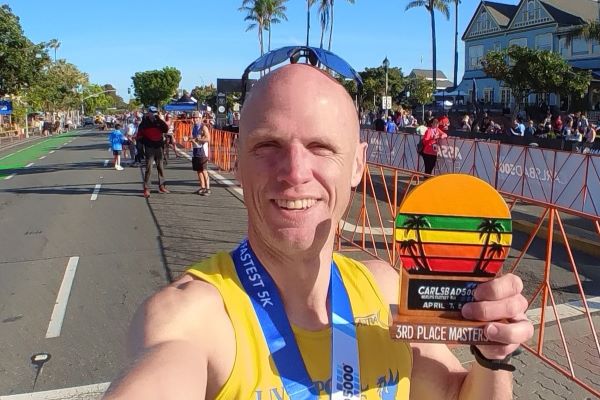James Horman is a Masters athlete who balances his running around full-time teaching, family life, coaching and coach education.
James’ recent recent running highlights include:
- 10th Place and 1st v40 at Manchester Half in 68:09 2023
- 3rd place at Carslbad 5000 ‘Worlds fastest 5Km’ Masters race, California, April 2024.
In the world of running, achieving success in marathons requires more than just physical training; it demands meticulous planning, reflective practice, and a supportive coaching environment. In a recent podcast interview, running coach James Horman shared valuable insights into marathon training, coaching methodologies, and the importance of fostering a vibrant running community.
Let’s delve into the key takeaways from his conversation, exploring topics such as pacing strategies, the role of coaching, and the potential for improvement in masters running.
On creating engaging running club sessions
James emphasises the importance of clubs in providing purposeful training to athletes, especially during large group sessions. James suggests: “Every session should have a focus. It’s about being very individual-centred. People have to feel that they’ve committed to coming to your coaching session, and have they gone away feeling as though they’ve got something out of it?” He advocates for clubs to create engaging sessions, such as relay races, hill sprints, or team challenges, that promote skill development, such as pace judgment and race strategy, alongside fostering a supportive and inclusive environment. By introducing exercises that enhance pace judgment, mental resilience, and race strategy, clubs can equip runners with valuable skills beyond basic endurance training.
James underscores the need for coaches to prioritise individual-centred coaching approaches that cater to the unique needs of each athlete. He stresses the importance of developing relationships, and motivating athletes effectively.
On Masters running
James debunks a few misconceptions surrounding aging athletes’ capabilities: “We’re not has-beens as soon as we go Vet 35, or whatever. That’s a real bug bear – that competitive element never dies”.
James emphasises the potential for continued improvement and competitiveness as runners age. He stresses the importance of recovery and proper training in maintaining performance over time. He says: “Speed work will make you feel a little bit weird, but getting into that uncomfortable place will actually benefit you.” He encourages older athletes to embrace challenges and pursue meaningful goals while prioritising recovery and listening to their bodies. By adopting a balanced approach to training and competition, Masters runners can continue to excel and enjoy their running journey.
On marathon training
Offering insights into marathon training, James shares some valuable tips on pacing and planning to help runners achieve their race goals successfully. He advocates for a very detailed pacing strategy, providing runners with mile-by-mile targets to ensure they maintain a steady pace throughout the race. By also incorporating hydration, nutrition, and mental mantras into this pacing chart, runners can approach the marathon with confidence.
Is it possible to have the perfect training cycle? James doesn’t think so: “The marathon is always going to have ups and downs. You’re never going to have a training block or a race day where everything’s going to go normal. So don’t let it ruin the whole experience.” James encourages athletes to reflect on their training journey, acknowledging both successes and setbacks, to identify areas for improvement and maintain motivation.
James insights into successful marathon running and coach education offers invaluable guidance for runners and coaches alike. By prioritising planning and reflection, runners can approach marathons with confidence and enjoyment, while coaches can support athletes in reaching their full potential. Whether you’re a seasoned runner or a novice, James’ advice serves as a reminder of the transformative power of running and the importance of fostering a supportive running community.
To delve deeper into these topics, consider listening to our full interview with James Horman on the UKRunChat Podcast for a comprehensive exploration of marathon training, Master running and coach education.
You can find James on Instagram here





